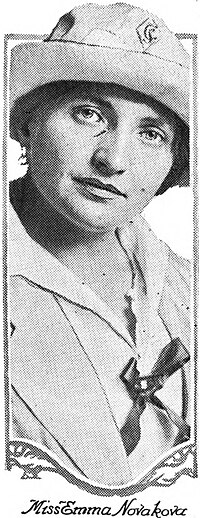The American Mission for Child Relief was headed by Capt. Joseph T. Shaw of New York and was composed of fifteen officers of the American Army of experience in the particular work to be done. This Mission organized the C. S. N. B. C. R. (Czechoslovakia National Bureau for Child Relief), the first work of which was to unite the various relief organizations which already existed.. These were several in number, each representing a different religion or political party. Under the head of the C. S. N. B. C. R. the president of the Czechoslovak Red Cross and the leading officers of the other relief organizations worked in harmony and in a very short time the C. S. N. B. C. R. had reopened the war kitchens and was prepared to feed as many children as there were supplies to feed. Actual feeding began the first of May of this year.
In asmuch as supplies were very meager and transportation in appalling condition, it was necessary to make a thorough investigation of the food needs of the country before attempting any actual feeding. It was found after such careful investigation that there were in round numbers 1,000,000 children in Czechoslovakia who were suffering from malnutrition. In the city of Prague, for example, 82% of all children below the age of 14 years were suffering from diseases brought on by malnutrition, namely, tuberculosis, rickets and enemia. The death rate amongst the children was appalling, reaching in some districts, for example—Kladno, in the center of the mining district, about 66%.
The combined efforts of the C. S. N. B. C. R. with all of the other organizations and the official assistance of the Czechoslovak government of 6,000,000 kronen per month (the American subvention was 12,000,000 kronen per month), totaled just enough to feed only 300,000 children. The other 700,000 near starving children it was impossible to reach. Though bad enough at the present moment in the middle of summer, the situation which will be faced by the country the coming winter is almost beyond human comprehension. The Congressional appropriation for Food Relief in Europe will soon be exhausted, leaving even the 300,000 children now being fed dependent up on some other agencies for their support.
Czechoslovakia looks to America in this crisis. When the writer left Prague but a few weeks ago he was charged by President Masaryk to carry the message to America that Czechoslovakia is not a beggar nation; that the country is rich in potential productivity—but at the present time the country finds itself in an emergency of a most extraordinary sort which is not of its own making and in which it needs outside assistance.  It is an emergency comparable to the condition of a prosperous man in a neighborhood who has suffered the burning of his home. For a certain time he is dependent upon his neighbors for shelter and food and clothing. But receiving this assistance, he will soon rebuild his house, re-clothe himself and re-stock his larder. At the present time Czechoslovakia has an empty larder, because the Austrians, following a diabolically prepared plan for the starvation of an entire nation, had driven every cow, horse and sheep which could walk out of the country, before they surrendered; had burned all agricultural im-
It is an emergency comparable to the condition of a prosperous man in a neighborhood who has suffered the burning of his home. For a certain time he is dependent upon his neighbors for shelter and food and clothing. But receiving this assistance, he will soon rebuild his house, re-clothe himself and re-stock his larder. At the present time Czechoslovakia has an empty larder, because the Austrians, following a diabolically prepared plan for the starvation of an entire nation, had driven every cow, horse and sheep which could walk out of the country, before they surrendered; had burned all agricultural im-
